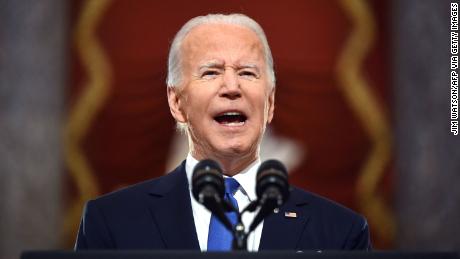
“You can’t love your country only when you win.”
That’s President Joe Biden during a speech he gave Thursday morning to commemorate the one-year anniversary of the US Capitol riot. It’s not only a memorable line — it’s likely to be the one that gets repeated the most today and in the days to come — but also a hugely important one if we hope to fully come to grips with what happened last January 6 and everything that led to that moment.
At the heart of the line is the idea of patriotism. Remember that Donald Trump ran for president in 2016 expressly on the idea of putting “America first.” The idea that animated both his campaign and his four years in the White House was that the United States was exceptional in the world and that, for too long, American leaders had been afraid to loudly and proudly proclaim that fact, choosing instead to make America subservient to lesser countries around the world.
“The future doesn’t belong to globalists,” Trump said in a 2019 foreign policy speech at the United Nations. “The future belongs to patriots.”
What makes America so special? Nothing differentiates us from the other world powers — China, Russia — more than our commitment to the peaceful transition of power every four years.
The idea that whether your preferred candidate wins that you a) accept the results of a presidential election as free and fair and b) recognize the winner as the president sits at the core of who we are as Americans.
You only need to go back to the 2000 election to understand the power — and uniqueness — of America and its commitment to the peaceful transition of power.
After a 36-day interregnum in which it wasn’t clear whether Al Gore or George W. Bush had been elected president, Gore conceded the election following an adverse Supreme Court ruling.
That he conceded was important. How he conceded mattered even more.
“For the sake of our unity as a people and the strength of our democracy, I offer my concession,” Gore said. “I also accept my responsibility, which I will discharge unconditionally, to honor the new president-elect and do everything possible to help him bring Americans together in fulfillment of the great vision that our Declaration of Independence defines and that our Constitution affirms and defends.”
Gore also cited the words of Stephen Douglas following a loss in the 1860 presidential race to Abraham Lincoln: “Partisan feeling must yield to patriotism. I’m with you, Mr. President, and God bless you.”
What Gore (and Douglas) understood was that this wasn’t all about them. Of course they would have rather won. Of course they thought they would make a better president than their opponent. But they also understood that patriotism and loyalty to the country meant shelving their personal feelings in favor of doing the right thing for the country.
Biden, in answer to reporters’ questions about why he didn’t mention Trump during his speech, flicked at that sentiment. Here’s the key bit:
“It’s not about me. It’s not about the vice president. It really isn’t. That’s the thing that bothers me most about the sort of attitude that seems to be emerging to some degree in American politics. … It’s not about me. It’s not about whether I’m president and she’s vice president. It’s about the system and somebody who tries to put himself above everything.”
Think of it in another way. True sportsmanship isn’t being gracious in victory. Anyone can do that. It’s being gracious in defeat. And not just anyone can do that.
The same goes for patriotism. It’s easy to love your country when they elect you. Or give you what you want. It’s a hell of a lot harder to love your country when you think they chose the wrong person or are headed down the wrong path.
True patriotism isn’t insisting you won even though there’s no evidence to back up those claims. True patriotism is working within the system to make the country as great as it can be — whether or not it feeds your personal interests.
Joe Biden gets that. Donald Trump never has.
As reported by CNN
